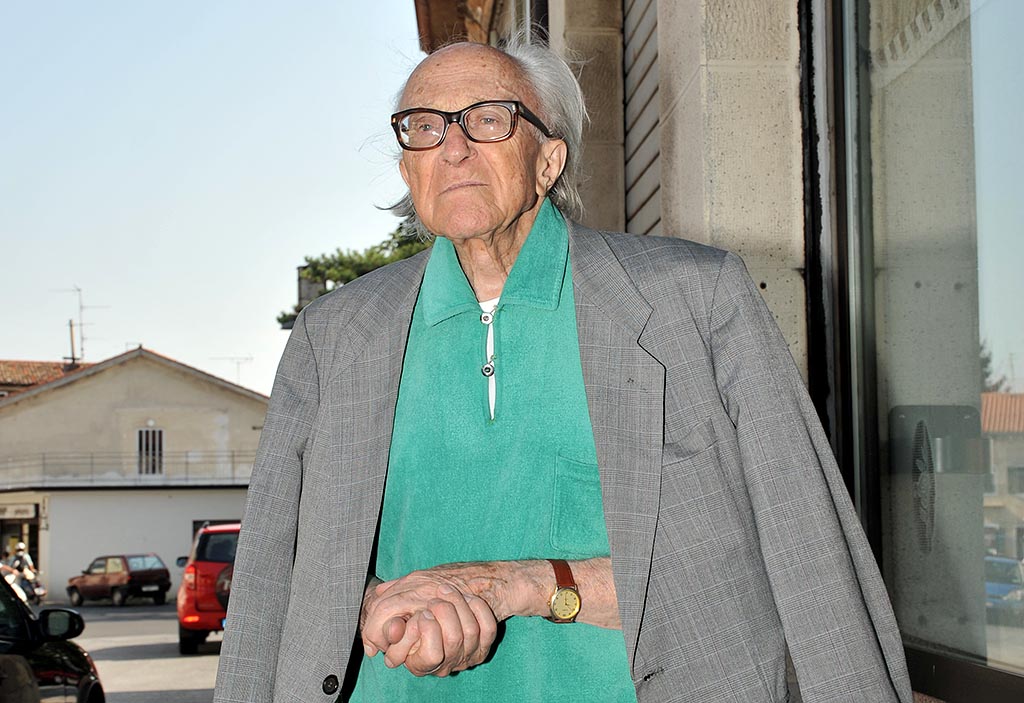By: Metod Berlec
The great Slovenian writer Boris Pahor died at the age of 109 at his home in Trieste. All his life he warned of the dangers of totalitarian regimes, of which he was a victim. His most famous work is the Necropolis, in which he described the camp experience and with which he became famous throughout Europe. The following is an interview with him, which was published in the magazine Demokracija on August 12th, 2010.
Boris Pahor was born in Trieste on August 26th, 1913. After finishing primary school, he attended the Catholic Seminary in Koper. In 1920, he witnessed the burning of the Slovene National House in Trieste by the fascists, as well as other crimes committed against the Slovene population living in Italy. During World War II, after the collapse of Mussolini’s Italy and the German occupation of the province of Trieste, he illegally participated in the liberation struggle. He spent the last year of the war in concentration camps (Natzweiler-Struthof, Dachau, Dora, Harzungen, and Bergen-Belsen). After the war, he defended the need for a Slovene democratic state and was the founder and editor of the magazine Zaliv.
He is the author of many literary works. He finally became famous with the book Necropolis, which was translated into many languages. In 1992, he received the Prešeren Award, and in recent years the awards have been growing. With the publication of the third reprint of the book Necropolis (over 100,000 copies in Italian), he was invited to a presentation on state television RAI (4.5 million viewers) on February 17th, 2008, where he presented his work and drew attention to the crimes committed by Italian fascism against Slovenes in the Julian region.
He is considered one of the most important living authors who writes in the Slovenian language. He is also nominated for the Nobel Prize in Literature. He is known for his criticism of fascism, Nazism, and Communism, he speaks without mincing matters. We tried to interview him before the referendum on the arbitration agreement, but unfortunately it did not work out. So, we talked to him at the end of July in the cafe Bar Luksa in Prosek near Trieste, which is a Slovenian village.
Mr. Pahor, how did you see the reconciliation ceremony of the three presidents in Trieste on July 13th this year, given that as a barely seven-year-old boy you saw the burning of the Slovenian National Hall in this city?
For Primorski dnevnik, my story was told by a journalist who described how as a boy with my sister I went from home in the centre of Trieste, where we lived, to Oberdan Square, which was close to our apartment, to see what was happening. I saw the National Hall in flames of fire. I am not exactly a person for celebrations, but sometimes they cannot be avoided. I was pleased that, as a condition for attending that event, the President set a memorial tribute to the National Hall. It was an act worthy of praise. But I will answer as I did for the Italian agency ANSA, which was also published by Il Piccolo: This is very nice, but it is not enough. The burning of the National Hall was only the beginning of fascist terror, which continued for twenty-five years.
If a person reads your books, it seems to him that this burning, that these flames of fire, this forced and unjust Rapallo border, which tore the Primorska Slovenes from their homeland, accompanied and marked you for the rest of your life.
Certainly, these events accompanied me. Not all my life, but certainly a big part of my youth. What followed the arson was terror. In all parts and places, they destroyed everything that was Slovenian. They drove around Slovenia’s villages and attacked. It was a real anti-Slovenian persecution. This was not one act, but an epochal affair begun two years before Benito Mussolini came to power in 1922. They did this with Mussolini’s approval. He rewarded all those people. Francesco Giunta was one of the main ringleaders from Bologna, a lawyer who came to Trieste and later became a secretary in the government.
In this sense, all this marked me in my youth. They took Slovenian schools from us. I did four classes of Slovenian primary school, then I had to cut it. I could not feel Italian, to write like an Italian. I did not go bankrupt rationally, but I was a failed student. The burning of the National Hall and everything connected with it ruined my youth. So, they put me in seminary. They hoped to try new tricks on me that would save me. It was a psychological problem. I had to solve it myself, as our Slovenian professors had to leave Primorska region. Many fled to Yugoslavia, others were transferred to the interior of Italy. In Koper, I could hardly figure out what the problem was: that I had to stay true to Sloveneness and that I had to surrender, that I would be Italian as much as would be enough to be able to produce classes normally. Once I understood that, I became a normal student. This was my main problem that I carried with me. The seminary was solid, but it was not my choice, so I had to go my own way and let it go. I finished two years of theology. After leaving, I had to go to Libya, as graduation was not officially valid, but it was necessary to enrol in university. I was a soldier, then I found myself in a camp, then in a sanatorium, only when I graduated in 1947 in Padua, I started living as normal a life as possible…

